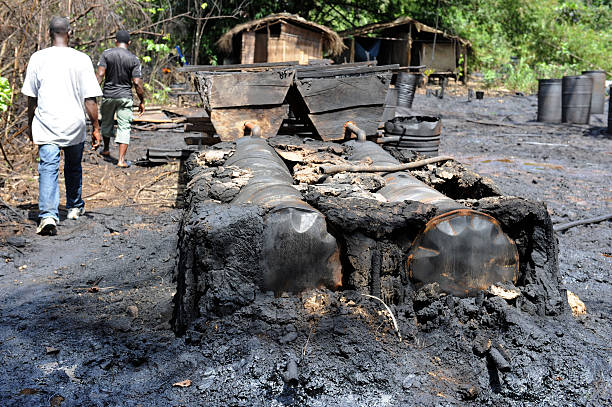
Nigerian forces raid illegal oil bunkering sites, recovering stolen crude and disrupting refining networks. PIUS UTOMI EKPEI/AFP via Getty Images
Major Crackdown Yields Over 300,000 Litres of Stolen Oil
Between January 20 and 26, 2025, troops of the Nigerian Army’s 6 Division dismantled 13 illegal bunkering hubs, deactivated over 150 refining ovens, and confiscated more than 300,000 litres of stolen petroleum products in operations conducted in collaboration with sister agencies around the Delta.
Authorities also arrested 15 suspects and seized boats, generators, and pumping equipment used in illicit refining.
In a separate raid, soldiers intercepted 221,000 litres of illegally refined oil, destroyed 37 refining sites, and seized five vehicles and eight motorcycles, disrupting attempts to establish new bunkering hubs across the region.
NSCDC Targeting Wider Network of Illegal Refineries
The Nigeria Security and Civil Defence Corps has also intensified efforts, destroying 71 illegal refineries and 22 bunkering sites over recent months.
Between January 2022 and early 2023, the NSCDC reported impounding 134 trucks and 36 boats used in pipeline siphoning and black-market transportation.
Authorities Seek Stakeholder Support and Transparency
The Nigerian Army has urged collaboration between local communities, oil firms, and security agencies to sustain anti-bunkering campaigns.
Major General Emmanuel Emekah emphasized that “everyone suffers” from oil theft and called for community vigilance in reporting suspicious activities.
Meanwhile, the Economic and Financial Crimes Commission (EFCC) has begun testing fuel from independent marketers to ensure supply integrity and identify adulterated or illegally sourced products.
This move aligns with wider policy measures aiming to curb revenue losses from theft and market malpractice.
Economic Losses and Recovery Efforts
Illegal oil bunkering continues to cost Nigeria billions annually, with past theft levels peaking at over 100,000 barrels per day. Government data shows theft has declined to around 5,000 barrels per day following sustained enforcement and regulatory reforms.
Also Read: Nigeria Seizes Millions in Smuggled Cannabis, Fuel and Rice at Border Points
Analysts warn that unless corruption within security and oil operations is addressed, and power and technology strengthened, the illicit trade will persist — undermining production and damaging fragile ecosystems.
United Nations Office on Drugs and Crime (UNODC) — Nigeria Programme
The United Nations Office on Drugs and Crime (UNODC) continues to collaborate with Nigerian authorities to combat organized crime linked to oil theft.
Through its Nigeria Programme, the UN agency supports initiatives aimed at strengthening law enforcement capacity, enhancing legal frameworks, and promoting accountability within the extractive sector.
These efforts are part of a broader international push to disrupt criminal networks profiting from illegal oil bunkering and to protect Nigeria’s economic and environmental stability.

